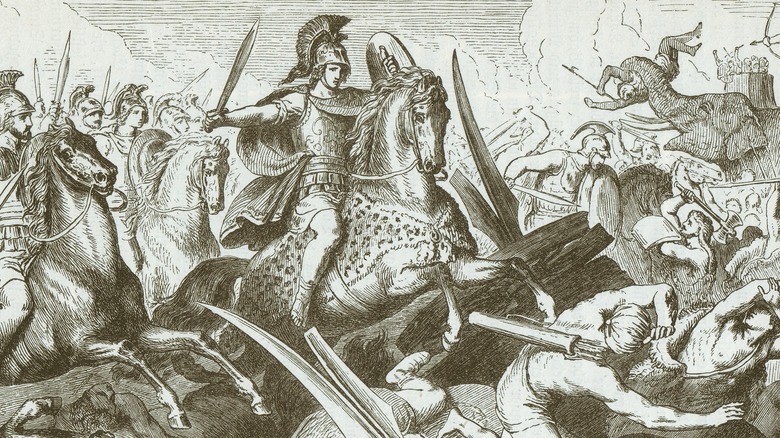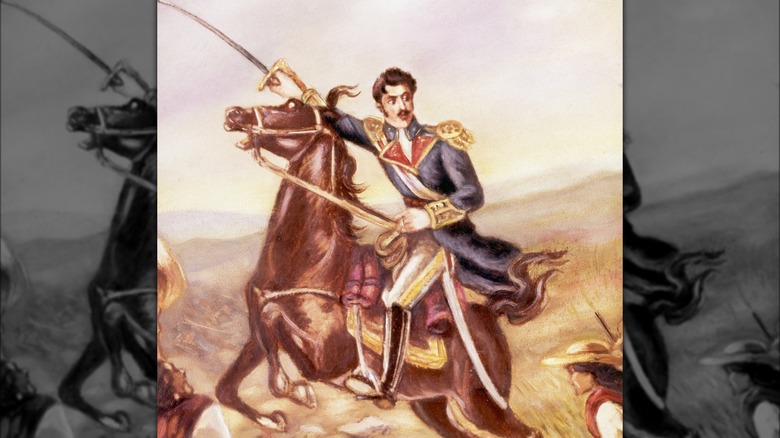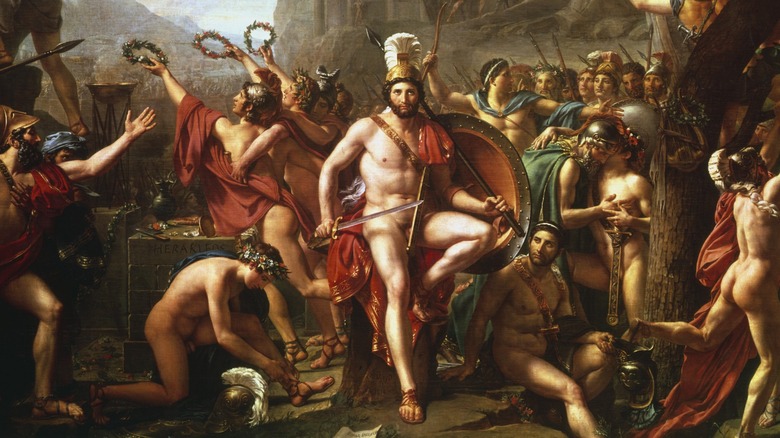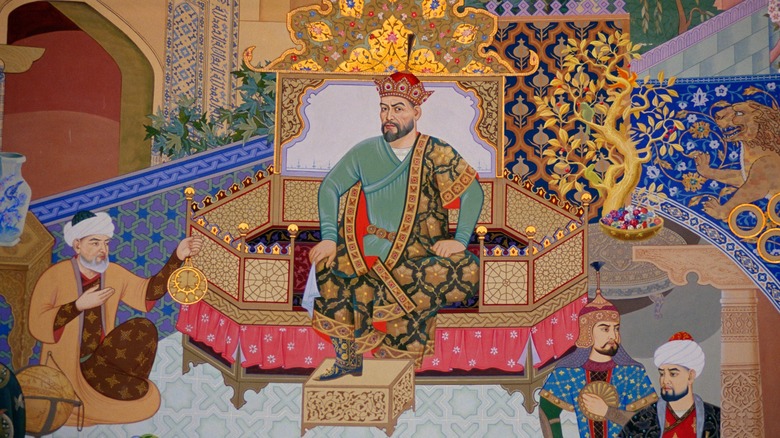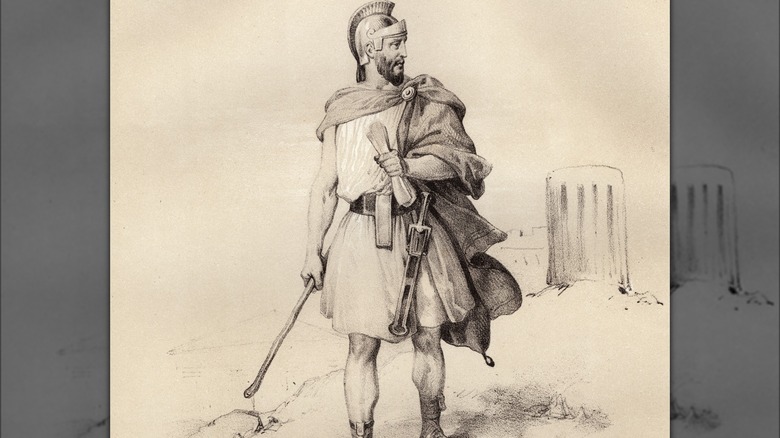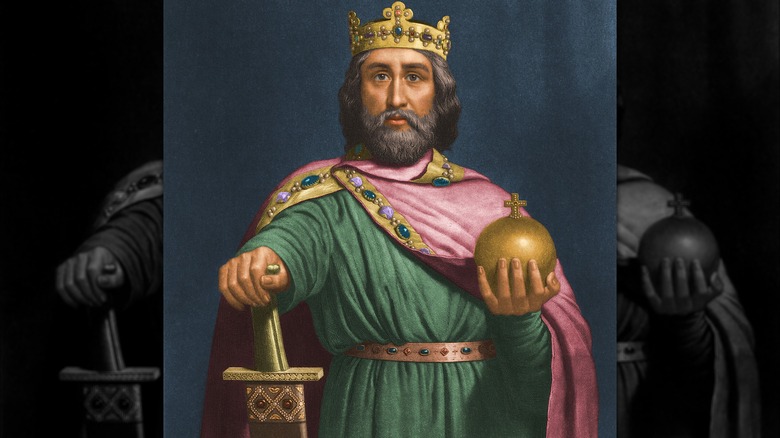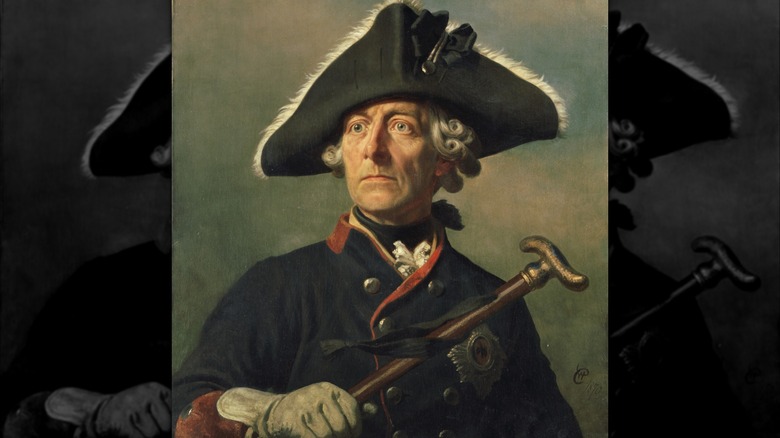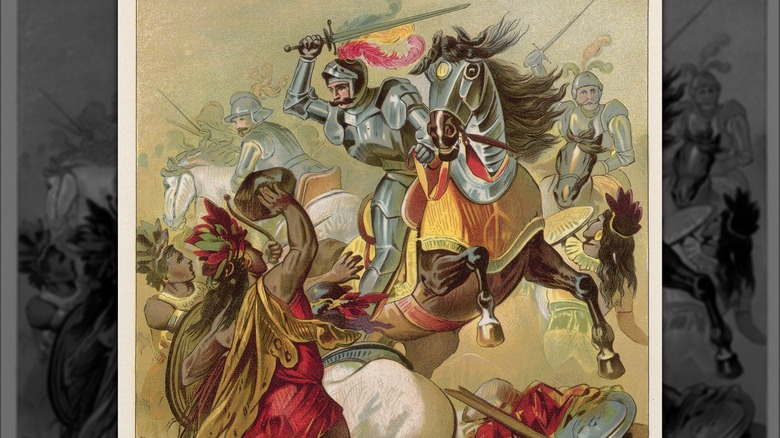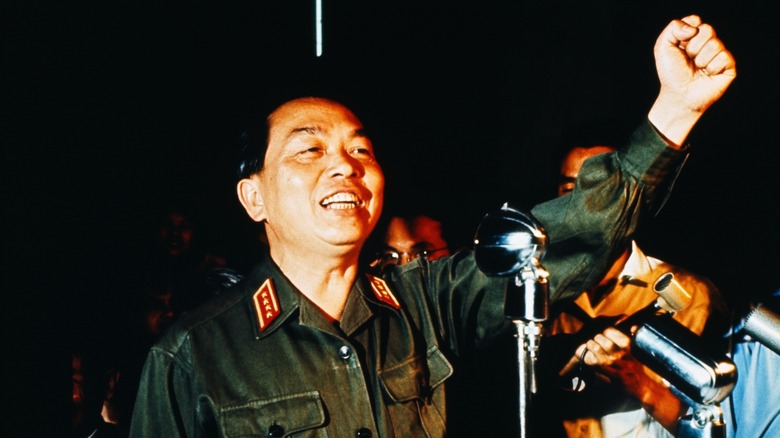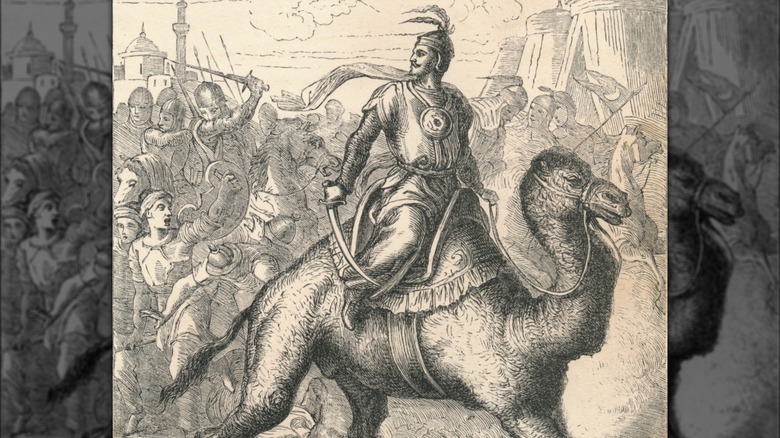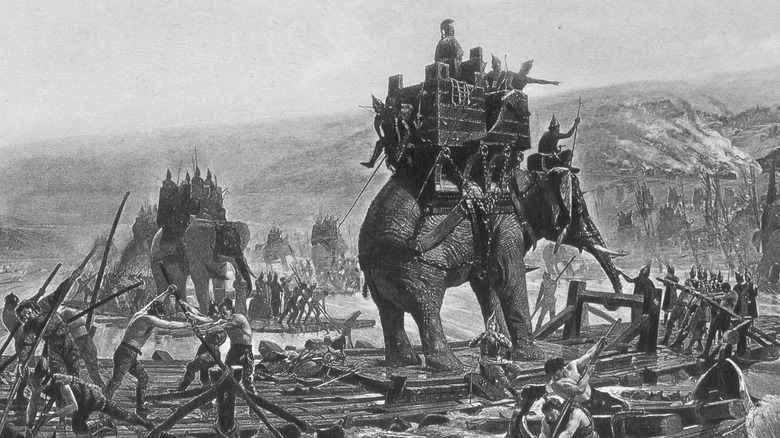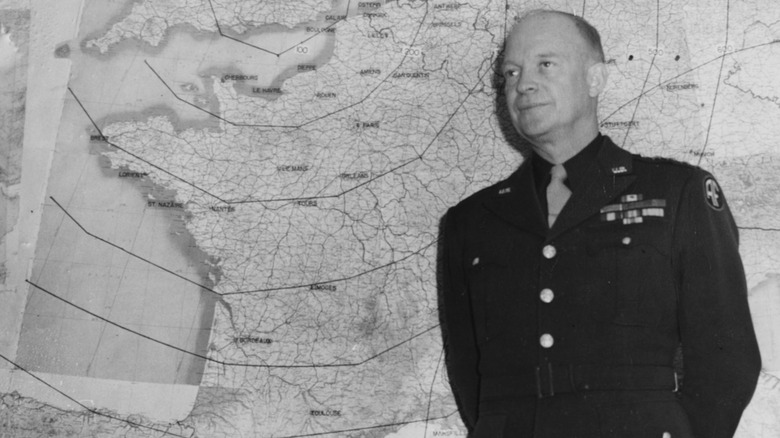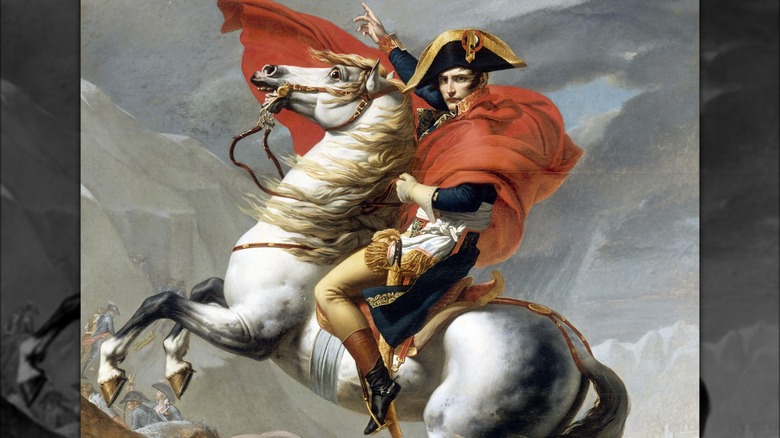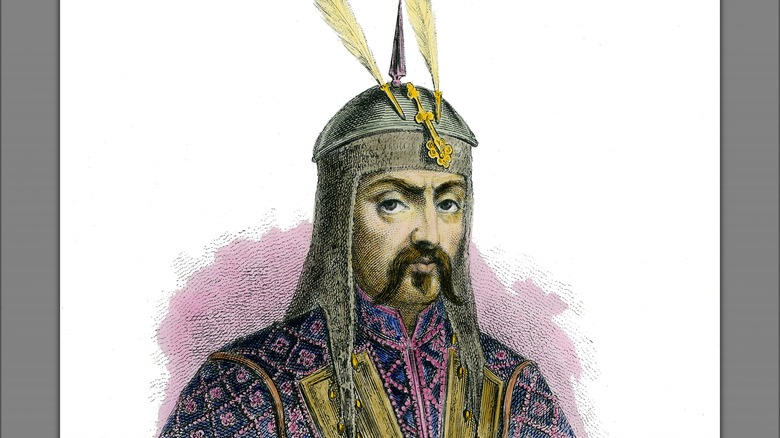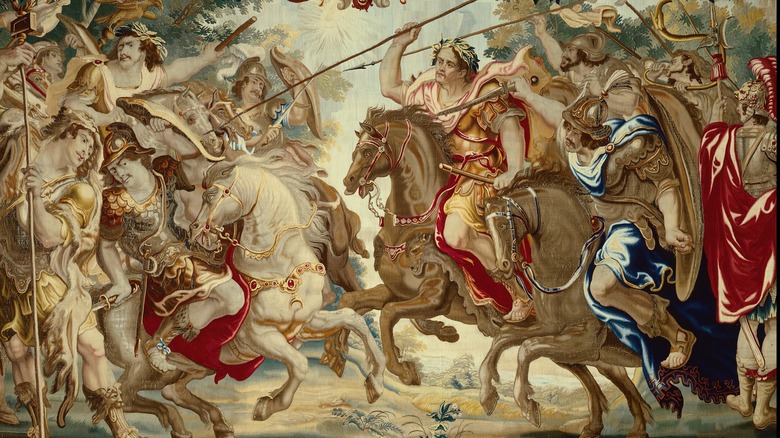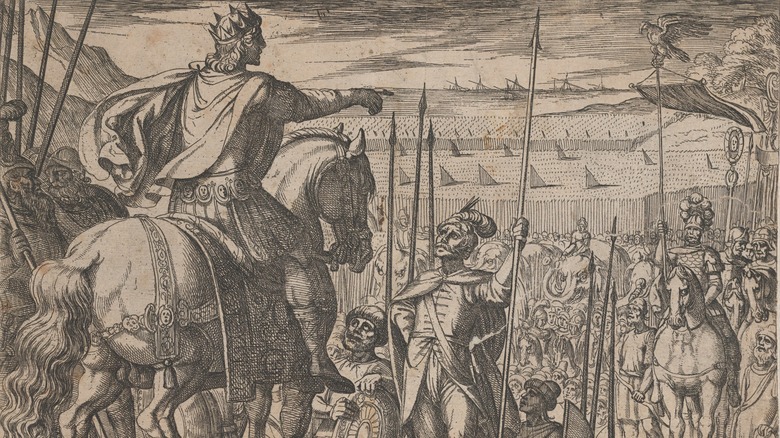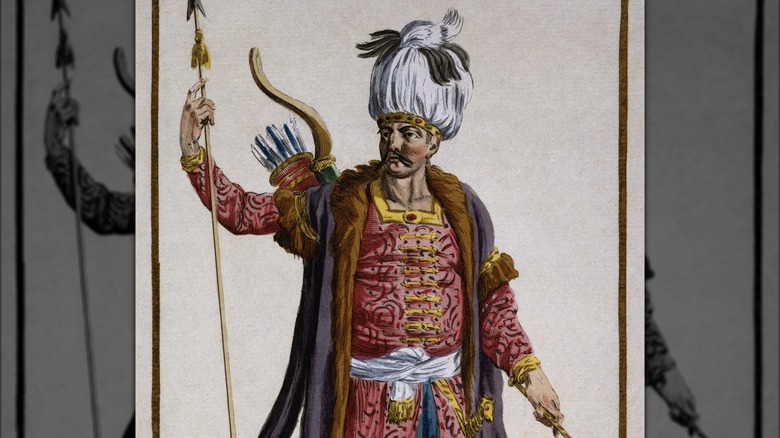The 15 Best Military Commanders In Human History, Ranked
If there has been one constant over the past few thousand years of human history, it is definitely warfare. From the age of ancient civilizations up through the present day, it seems like armies have always been clashing against each other at least somewhere. Undoubtedly, some of these commanders have been better than others, but of all the great commanders throughout history, who is truly the best?
Could it be King Leonidas and his army of 300 Spartans who fought Xerxes and the Persians until the bloody end, or did Alexander the Great and his many conquests reign supreme? There have been so many worthy generals and leaders over the years that it's hard to keep track, but only a handful can really have an argument to be the greatest of all time.
So what defines the greatest commander? Obviously, the barometer has shifted over the past thousand years, and it's difficult to judge ancient heroes against generals of today. For our list, we took into account how long they commanded, what significant battles they won, their contributions to the field of strategy, the size of the territory they held or conquered, and their lasting legacy in historiography. Looking back from the Ancient Greeks through the 20th century, these are the 15 best military commanders in human history, ranked.
#15: Simón Bolívar
Widely known by his nickname of "El Libertador", Simón Bolívar's exploits in South America during the early-19th century easily make him one of history's best commanders. Bolívar received military training as a young boy in his home country of Venezuela, and though his first campaigns to liberate his homeland were unsuccessful, he rebounded and within a few years was establishing his bonafide military chops.
Bolívar's first victories came against the Spanish who were trying to maintain their colonial hold on the continent, and he owed them to both his tactics and recruiting. To staff his army, Bolívar smartly created a combined force of Haitian Creoles, Venezuelan slaves, other anti-royalists, and foreign British and Irish soldiers. With weapons from Haiti, Bolívar led his men on a daring route to sneak up on the Spanish army at the Battle of Boyacá in Colombia, where his army decisively defeated them and took around 1,800 prisoners. After his victory, Bolívar established Gran Colombia in 1819.
Deftly employing good commanders and tactics, Bolívar was soon able to liberate massive amounts of territory in South America, including Colombia, Venezuela, Ecuador, Peru, and Bolivia — the latter of which his subordinates named after him due to his greatness — consistently defeating the older and more respected professional Spanish army. Bolívar's empire was constantly beset by civil war and did not last, or he would be ranked higher, but it's impossible to deny his genius.
#14: King Leonidas of Sparta
Forever immortalized in the Hollywood epic "300," the Spartan King Leonidas deserves acclaim for his bravery and ingenuity. Leonidas was a late-fifth century B.C. Spartan king, and his victory as the leader of Greek forces against King Xerxes and the Persians in the Battle of Thermopylae in 480 showed his brilliance and what made him so great.
At Thermopylae, Leonidas' force was about 7,000 strong, while scholars estimate that Xerxes may have had as many as 300,000 personnel on his side. Knowing that he had a dearth of soldiers, Leonidas astutely made Xerxes push his army through the narrow Thermopylae pass, largely negating their numerical superiority and forcing them to fight the Greeks hand-to-hand — to the Persians' disadvantage. The beleaguered Greeks were able to hold out for days against the relentless Persian attacks, inflicting countless casualties without breaking.
The Greeks finally fell because the notorious Greek traitor Ephialtes informed the Persians about a secret passageway, allowing them to flank the Greeks and defeat them, otherwise the Persians may never have gotten through. Even when Leonidas knew he was surrounded, he still opted to fight to the death with his 300 elite Spartans, refusing to surrender and showing the courage of a true soldier. Leonidas' cunning tactics allowed the Greeks to hold out against a force more than 40 times their strength for days, which was one of the biggest military achievements in history and indicative only of a true military leader.
#13: Tamerlane
Timur Lenk (also known as Timur, Timur the Lame, or Tamerlane), was a 14th-century conqueror who rose from being a nomad to the most important man in Asia. Born into a Turkish-Mongol tribe in 1336, Tamerlane became the leader of Transoxiana (present-day Uzbekistan) in 1370, soon creating one of history's most vicious armies. While it's hard to gauge how big his army was, some estimates put it as high as 200,000 by 1404 (according to K.Z. Ashrafyan in "History of Civilizations in Central Asia, Vol. 4").
Throughout his life, Tamerlane was constantly expanding his empire through brutal conquests. When it first started, all he held was Samarkand. Yet, at its height, the Timurid Empire spanned west from present-day southern Turkey all the way to China in the east, and from the Aral and Caspian Seas in the north down to the Arabian Sea south. It was an almost unprecedented expansion of territory, and Tamerlane was at the forefront of the army during all of its conquests. A relative of Genghis Khan by marriage, Tamerlane employed similar fighting techniques that highlighted the strength and mobility of his nomad army, and they used whatever weapons they had at their disposal.
It's impossible to mention the military history of Asia without devoting a large section to Tamerlane, and the fact that his empire quickly fell apart once he died proves how valuable he was. Given the nickname Timur the Lame only by his detractors, Tamerlane's dominance was unparalleled in his time.
#12: Themistocles
The Ancient Greek commander Themistocles came to prominence during the Greco-Persian Wars, and it was his foresight and tactical skill showcased at the 480 B.C. Battle of Salamis that helped save Greece from ultimate destruction. At Salamis, Themistocles was at the head of a much smaller force of Greeks taking on the formidable Persian navy, and while historical estimates are difficult to parse, the Persians greatly outnumbered the Greeks, potentially by hundreds of ships.
Yet, it was through Themistocles' leadership that not only were the Greeks able to survive, but they managed to force a Persian retreat back to Asia, ending the naval invasion. In the years prior to the battle, Themistocles was the catalyst in building up the Greek fleet from a small to adequate force, without which they would not have stood a chance. During the fighting, Themistocles personally commanded hundreds of vessels, and it was through his deft strategy of luring the large Persian force into narrow straits that allowed the smaller Greek force to overpower them and sink hundreds of Persian ships while losing barely a few dozen of their own.
The Battle of Salamis was supposed to be Xerxes' final destruction of the Greeks, but it turned into one of his most costly defeats, and along with the subsequent Battle of Plataea stopped the Persian invasion of Greece cold. Without Themistocles' anticipation and savvy, the Greeks would surely have been obliterated at Salamis, and Western history would have been completely different without him.
#11: Charlemagne
By the end of his more than four decades of rule, Charlemagne, or Charles the Great, was the King of the Franks and the Lombards, and was the Holy Roman Emperor, and he had his military prowess to thank for it. Charlemagne came to the throne of the Frankish Kingdom in 768 following the death of his father King Pepin the Short, and his first victories came in 769 against rebels in Aquitaine and Gascony. A few years later, in 772, he began his invasions of Saxony, kicking off three decades of warfare.
With a reputation even larger than his formidable 6-foot, 3-inch figure, Charlemagne was known as a warrior-king who commanded his troops in person to amazing success. He was both loved and feared by those he led, and historians hold him responsible for uniting together Christian Europe for the first time. As he was slowly subjugating Saxony, Charlemagne also led his armies to victories in Italy against the Lombards, in Gaul against the Umayyads, and in Bavaria against the Avars. This culminated in him becoming the first Holy Roman Emperor in 800, a title he would hold until his death 14 years later.
During his reign, Charlemagne's expansion was seemingly only capped by the sea and the logistics of maintaining and governing such a massive frontier, and his territory was seemingly endless. His more than four decades of continuous rule and military expansion make him among the longest-lasting commanders in history, and his kingdom among the greatest.
#10: Frederick the Great
Frederick II the Great came to power in Prussia in 1740 after his father Frederick William I died, and he immediately began establishing his incredible military prestige. Bequeathed a finely tuned and professional army by his father, historians often credit Frederick II with establishing Germany's strict and potent martial tradition. During his rule, Frederick II participated in two great wars, the War of Austrian Succession (1740-1748) and the Seven Years' War (1756-1763), both of which added to his military cachet.
Frederick II was renowned for his fearlessness in battle, willing to fight when others would have surrendered or fled, and he built upon his father's work to craft his army into a mobile and vicious fighting force. He was able to regain Silesia during the Austrian war, a possession that had been lost for a century, and his leadership during the Seven Years' War is largely what earned him his military fame.
At the Battle of Leuthen, Frederick II beat an Austrian force more than twice his army's size (36,000 vs 80,000) and took ¼ of the enemy as prisoners. At the Battle of Rossbach, Frederick's II defeat of the French army was so severe they started to reassess their entire military philosophy. Frederick II earned his nickname "the Great" due to his military talents, which resulted in not much expansion but a solid 46-year reign in power and the strengthening of the Prussian Empire for the future.
#9: Hernán Cortés
Hernán Cortés might not have had the longest military career, but his achievement at Tenochtitlán is among the most impressive in history. At Tenochtitlán, Cortés used a masterful combination of tactics and planning to bring about the destruction of the mighty Aztec empire. A Spanish conquistador, Cortés landed in Mexico in 1519 with only about 600 men and barely a dozen horses, but he soon recruited the locals to almost triple his forces.
Knowing that the massive Aztec civilization and army were waiting for them, Cortés smartly made allies with the local Tlaxcala Natives who resented their treatment by the Aztecs and wanted to see them taken down. Cortés and his Conquistador-Native army marched on Tenochtitlán in 1519, immediately imprisoning the Aztec leader Montezuma, even with a small army. After briefly being forced to abandon Tenochtitlán following an Aztec revolt under one of Cortés' subordinates, Cortés defeated them at Otumba before laying siege to the city. His small Spanish force was supplemented by around 100,000 Tlaxacans, and after months of relentless warfare, Cortés took over the Aztec capital in August 1521.
The Aztec empire was made up of millions loyal to Montezuma, but Cortés immediately made himself their new ruler upon his conquest. It was his adept and clever plan of allying with the natives that allowed them to become victorious, and it was among the most masterful campaigns ever commenced.
#8: Vo Nguyen Giap
Though he might be persona non grata to many in the West, Vo Nguyen Giap's accomplishments are almost unparalleled among modern leaders. A student of Chinese communist leader Mao Zedong's military theories, Giap created the North Vietnamese Army (NVA) from practically nothing during World War II to become one of the most formidable in modern history.
From 1946–1954, Giap's infant NVA took on the highly-professional French Army, eventually stunning the French with their defeat at Dien Bien Phu. At Dien Bien Phu, Giap created the logistics that led to an overwhelming superiority of artillery, including accompanying cadres moving heavy equipment up mountain jungles, which sealed the French fate. During the Second Indochina War, also known as the Vietnam War, Giap led the NVA against the even more powerful United States Army, but once again defeated them.
It was during the Vietnam War that Giap displayed some of his best military brilliance. Knowing that the U.S. forces were far superior in manpower and materiel, he utilized guerilla warfare to break the back of the American army by slowly wearing them down and disillusioning the U.S. government of its prospects for success.
As the military genius and architect behind the NVA victories over both the French and the U.S., it's impossible to deny Giap's military capabilities. His orchestrated victory at Dien Bien Phu was a landmark in terms of achievements for third-world revolutionary armies, and Vietnam would not exist today without him.
#7: Saladin
Saladin, was a powerful Kurdish and Muslim sultan and founder of the Ayyubid dynasty, who made his mark in the 12th century during the Christian Crusades of the Holy Lands. Saladin began his career fighting under his uncle for the emir Nur al-Din during the Second Crusade, and upon the latter's death in 1174, Saladin began to start expanding his rule to unify the Muslim world under Sunni instead of Shiite Islamic doctrine.
Within a few years, Saladin was able to bring together Egypt, Yemen, and southern Syria under his control, though Aleppo remained out of his reach at first. However, he soon conquered Aleppo and then Mosul in 1183–1185, before setting his sights on the Crusaders' Latin states, declaring a Jihad or Holy War against them. In 1187 at the Battle of Hattin, Saladin's troops defeated a mighty Frankish Crusader force, basically leaving the door open to the most important of the Latin states: the Kingdom of Jerusalem. Saladin then immediately took Jerusalem, evicting the Franks for the first time since they had established the kingdom nearly a century prior.
It was an incredible victory over the relentless Christian forces, and Saladin enhanced his stature by showing immense restraint and allowing the Christians in the city to buy their freedom instead of slaughtering them. Saladin's military skills are matched by his reputation for benevolence and humility, and he was able to gain the respect of even his most ardent foes, proof of his amazing talents.
#6: Hannibal Barca
By the age of 26, Carthaginian general Hannibal Barca could already be considered a very competent commander. He was so popular among his troops that they made him their leader in 221 B.C., and Barca did not let them down. Despite being young, Barca successfully spread Carthaginian (or Punic) influence throughout the Iberian Peninsula. Yet, his attack on Saguntum in 219 sparked the Second Punic War against Rome, but that would turn out to be his finest hour.
To fight the Romans, Barca made one of the most storied marches in history, when he took his army of around 100,000, which also had war elephants, on a 1,000-mile trek through the Pyrenees Mountains and Swiss Alps. Though the arduous passing thinned their numbers, Barca still defeated the famous Roman Gen. Publius Cornelius Scipio, but even greater things lay ahead in 216 at the Battle of Cannae. At Cannae, Barca invented what is known as the "double envelopment," which he used to destroy a Roman force 80,000 strong with only half as many soldiers himself. Barca split his force into three columns, and when the Romans attacked the center the two Punic side columns enveloped the Roman force from the flanks and rear, devastating them.
It was one of the all-time great attacks in history, leading to 48,500 Roman deaths. More than 2,000 years later, Barca's techniques were still being repeated, including by the Germans in both World Wars I & II, showing his incredible aptitude.
#5: Dwight D. Eisenhower
In addition to serving two terms as President of the United States, Dwight D. "Ike" Eisenhower also had a very prolific military career before he entered office. Born in 1890, Eisenhower was educated at military schools like West Point, the Army's Command and General Staff School, and the Army War College. While he did not fight in the First World War, Eisenhower still earned the Distinguished Service Star of the Philippines in the interwar years for helping retool their army, an early indication of his command skills.
During World War II, Ike led three of the most important Allied invasions in the entire war. First, he spearheaded the invasion of Africa, known as Operation Torch, in November 1942, and he also commanded the Allied invasion of Sicily in June 1943 shortly after Torch was completed. This led to him becoming the Supreme Commander of Allied Expeditionary Forces the following December, where he undertook perhaps his greatest achievement, the Allied invasion of Normandy, known as Operation Overlord. The invasions of Africa, Sicily, and Normandy were the biggest turning points in the war and helped ensure the Allied victory, and they were successful thanks to Ike's planning and military genius.
To his troops, Eisenhower was someone who understood the complexities and tribulations of being on the front lines at war and, he would even meet them in person. He was a true soldier's soldier and an excellent commander.
#4: Napoleon
The subject of countless biographies, Napoleon Bonaparte is perhaps history's greatest modern commander. Born in 1769 in Corsica, France, Bonaparte became educated at military academies as a boy and was already commissioned in the artillery by the time he was a teenager. During the early years of the French Revolution, he largely stood on the sidelines, but in 1793 he rejoined the French Army and earned himself glory during the Siege of Toulon and while fighting against Austria.
Though he was advised to attempt a cross-channel invasion of England, Bonaparte knew that it would be a bad idea due to the strength of the British Royal Navy. He deftly avoided the risky attack of England, and instead concentrated his forces south in Egypt, successfully defeating the Mamluks who had been in charge for centuries. While his Asian and African campaigns would ultimately end in failure, back on the mainland Bonaparte took over the government in 1799 and became France's new ruler. As Emperor of France, Bonaparte would considerably expand French territory throughout Europe, taking out the larger Austrian and Russian armies several times and ruling territory from southern Italy to present-day Germany.
By the early 1800s, Bonaparte had almost single-handedly restored French military prestige in Europe, and it was only his disastrous invasion of Russia that ultimately doomed him. His contributions in the field of military tactics and strategy are almost unparalleled among modern generals, and he is easily a top-five military commander of all time.
#3: Genghis Khan
Few names are as synonymous with military excellence as the Asian ruler Genghis Khan. Born in 1162 in northern Mongolia as Temujin, Khan first started to build his reputation as the ultimate warrior when he rescued his wife from captivity as a teenager. During his career, Khan was able to unite an unprecedented amount of people and territory together, creating a mega-empire that is considered to be the largest in human history. At its peak, Khan commanded territory from Korea on the outskirts of eastern Asia to present-day Hungary in central Europe, or about 11-12 million continuous square miles.
When building his empire, Khan first skillfully united the nomadic steppe tribes of modern-day Mongolia, before expanding his empire into northern China and then west towards modern-day Afghanistan and Iran. Khan used his cavalry to devastating effect during his career, and he would employ various tactics, like faking a withdrawal only to come roaring back and initiate a siege or using enemy captives as human shields, to amazing success. Khan's legacy lies in his ability to create a massive army out of conquered subjects, his masterful use of cavalry, his capabilities to use smaller forces to defeat larger ones, and the mind-blowing size of his empire.
During his life, Khan created a persona of a ruthless and brutal emperor who would slaughter and destroy entire cities after conquering them. Still, his soldiers were intensely loyal to him and he outlived his empire, a trait few commanders share.
#2: Julius Caesar
There are only a few names in history as famous as that of Julius Caesar. Thought to be born in 100 B.C., Caesar began his career as a junior officer in the Roman army, and at one point earned the prestigious Corona Civica award for his actions of saving a fellow soldier.
However, it was after becoming consul in the year 59 leading to the defeat of neighboring Gaul from the years 58-50 that Caesar's star really started to rise. During the civil war against Pompey, Caesar's prowess as a commander was on full display, as he quickly conquered lands in Italy, Spain, and Macedonia (Greece), and soon he started invading northern Africa in Egypt. At its apogee, Caesar's empire almost formed a complete ring around the Mediterranean Sea, and he held territory stretching from the Caspian Sea to the Strait of Gibraltar — something almost unfathomable for that time period.
As a commander, Caesar is renowned for his impeccable skill in organizing and training the Roman army. He made sure they were in top shape for battle, and he led by example by marching at the head of his men and inspiring them to fight for him against the enemy. In addition, in battle, he was smart and made quick decisions, and he earned his troops' loyalty by giving them commendations and promotions. To many, Caesar was the finest of all the Roman generals, and his conquests were certainly the greatest.
#1: Alexander the Great
With Alexander the Great, it's often impossible to separate fact from fiction regarding his brilliant career, but if even a fraction of what is said about him is remotely true, he clearly stands alone as history's greatest commander. Stories about his greatness began when he was just a teenager, when he was said to have subdued a wild horse and made him his own. He gained further acclaim by defeating the Theban army in 338 B.C., and two years later he ascended to the Macedonian throne.
After becoming King, Alexander began expansion on what was to become by far the greatest empire of its time. He defeated Darius and the Persians in present-day Turkey, before taking on the Phoenicians in the area of the Levant at Tyre. He then turned his sights on Egypt and Persia, conquering both before then improbably uniting them together, creating a contiguous empire that stretched from Anatolia all the way to the western edges of India.
Unfortunately, there were not many contemporary sources on Alexander's life, leaving historians to largely fill in the blanks about his rule. Still, he is greatly revered for the absurd and almost unimaginable extent of his empire and the countless battles he won. Alexander took on some of the greatest armies of the day, and he decisively beat them all down. At a time when skill and not technology determined the outcome of battle, Alexander proved himself to be head and shoulders above the rest.
How we chose the best military commanders
It is challenging to compare and correlate how ancient and modern commanders stack up against each other considering how much the world has changed over the years, so we took many different aspects into account. Our main criteria were based on a combination of how much territory they were able to command and conquer, how many and what significant battles they fought in and won, their ultimate contributions to the field of military science and strategy, and their lasting legacy in historiography. For older commanders, the size of their territory, length of reign, and their lasting legacy were more important, while newer commanders had more weight given to the battles they fought in how much they influenced the future of fighting.
